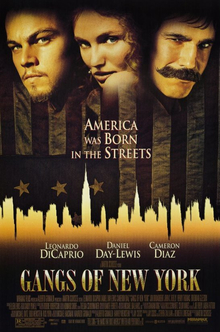 |
| Daniel Day-Lewis in Nine |
Cast: Daniel Day-Lewis, Marion Cotillard, Penélope Cruz, Judi Dench, Nicole Kidman, Kate Hudson, Fergie, Sophia Loren. Screenplay: Michael Tolkin, Anthony Minghella, based on a musical by Arthur Kopit, Maury Yeston, and Mario Fratti and a screenplay by Federico Fellini, Ennio Flaiano, Tullio Pinelli, and Brunello Rondi. Cinematography: Dion Beebe. Production design: John Myhre. Film editing: Claire Simpson, Wyatt Smith. Music: Andrea Guerra, songs by Maury Yeston.
Federico Fellini's 1963 classic 8 1/2 is a work of self-deprecating wit, in which a director played by Marcello Mastroianni, who was Fellini's cinematic alter ego, tries to launch a new film while at the same time scrutinizing his failures and foibles, most of which have to do with women, including his mother, his wife, his mistresses, and his flings. Any attempt to remake or adapt that film is going to lack its essence: the personality of Fellini himself. On Broadway, the musicalization of the film as Nine substituted performance for personality, using the very slight plot of the movie as a reason to string together songs and production numbers. But by returning the stage production to its original medium, Rob Marshall's Nine not only loses the energy of live performance but also invites comparison of one movie to the other. Nine is essentially a remake, and has to be judged as that. Everyone in Marshall's film works very hard to put it across. As Guido, Daniel Day-Lewis energetically tries to efface the memory of Mastroianni is the tormented director. Penélope Cruz has a sizzling musical number and manages to create a vivid character out of Carla, Guido's mistress. Marion Cotillard sings well and acts beautifully as Guido's wife. And just the presence of Sophia Loren as Guido's mother is enough to cast a spell over the movie. But in the end nothing works, and the film falls flat where 8 1/2 sent moviegoers out of the theater with a sense of exhilaration, of having experienced a director's complete and complex vision. Once, while typing the title of Marshall's movie, I wrote None. Maybe I should have left the typo.














